Evaluating Country Programmes - OECD Online Bookshop
Evaluating Country Programmes - OECD Online Bookshop
Evaluating Country Programmes - OECD Online Bookshop
You also want an ePaper? Increase the reach of your titles
YUMPU automatically turns print PDFs into web optimized ePapers that Google loves.
<strong>Evaluating</strong> <strong>Country</strong> <strong>Programmes</strong><br />
268<br />
growth of about 68% over this period outpaced Latin America’s. Yet these Asian<br />
countries increased their GDP by 168% over the same period. This suggests the<br />
possibility that Costa Rican economic growth might be substantially faster were the<br />
country to adopt more future-oriented policies (e.g. increase public sector savings<br />
and investment). Substantially faster growth would permit Costa Rican citizens to<br />
enjoy a higher standard of living and larger resources for the satisfaction of both<br />
public and private needs.<br />
Lessons learned<br />
This section draws a few lessons from the Costa Rican experience that may be<br />
relevant for foreign assistance programmes in other countries. It asks whether, overall,<br />
USAID assistance to Costa Rica was worth the cost.<br />
– Foreign aid can work. The evidence strongly supports the conclusion that<br />
USAID played a strong positive role in Costa Rican development. The fact<br />
that successive Costa Rican governments were committed to broad-based<br />
growth and to democratic processes made the relationship between the<br />
Costa Rican Government and USAID consistently one of shared purpose.<br />
Indeed, a collaborative style and joint decision-making are perhaps the most<br />
notable characteristics of US aid to Costa Rica.<br />
– “Development science” has progressed. Looking at the prescriptions and<br />
projects undertaken by USAID over time, it seems clear that development<br />
practitioners have made considerable progress in understanding the development<br />
process, though it remains rudimentary in many areas. Many mistaken<br />
approaches of the past have been identified and abandoned. Lack of<br />
knowledge flawed the high-development and basic human needs<br />
approaches. Two cases of this ignorance are worth noting. First, while economists<br />
were well versed in the concept of “market failure”, they had thought<br />
little about the possibility of “government failure”. Second, they failed to<br />
understand the key role of markets, and particularly that from international<br />
trade, in promoting efficiency. When better knowledge showed that existing<br />
concepts were inadequate, the better concepts were gradually embraced. At<br />
the same time, development policy has by no means become an exact science.<br />
Nevertheless, USAID and other development agencies are more effective<br />
now than earlier, because they work from a stronger knowledge base.<br />
– <strong>Country</strong> experience pays off. The USAID comparative advantage comes in<br />
greater part from the trust that USAID staff members engender in host country<br />
officials. To a substantial degree, this can come only from extensive in-country<br />
experience. In the technical offices, people who spent long periods (five to<br />
seven years) in the country seem to have achieved the most. Of the four Mission<br />
directors who were most successful, three were “recycled”: they had previous<br />
experience in the country.<br />
<strong>OECD</strong> 1999



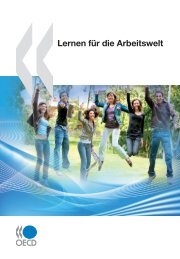

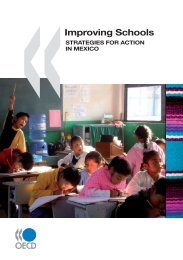
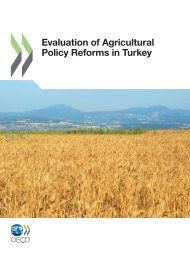
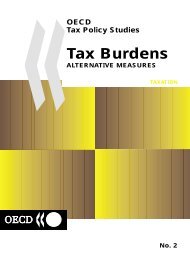
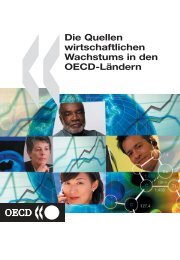
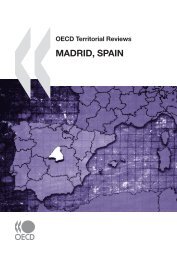


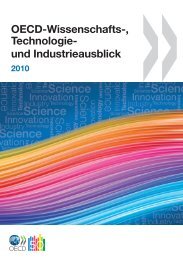
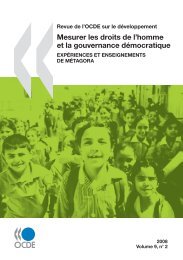
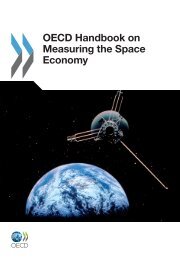
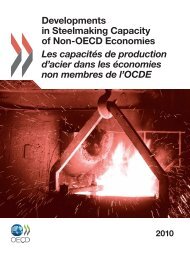
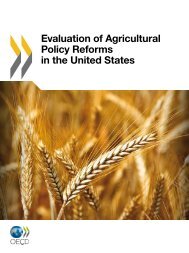
![CQE=U]^\]Z: KAZAKHSTAN - OECD Online Bookshop](https://img.yumpu.com/3915768/1/190x253/cqeuz-kazakhstan-oecd-online-bookshop.jpg?quality=85)